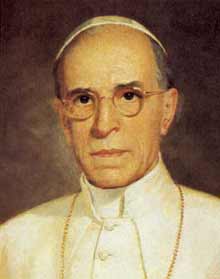July 18: Do As I Say, Not As I Do
Papal Infallibility (1870)
It was on this date, July 18, 1870, at the first Vatican Council, that the Pope was declared Infallible.* Although the most powerful of the medieval Popes, Gregory VII and Innocent III, claimed to be infallible, it is little remembered that the Church hierarchy resisted making the claim official for over sixteen centuries. Even in 1870, there was much opposition among the bishops and theologians.
The drafting of the doctrine had nothing to do with the lamb of God and everything to do with the sausage-making of politics, with a little patronage thrown in for seasoning. The infallibility doctrine passed by bribery and intimidation and after a long and very heated struggle. Atheist historian (and former priest) Joseph McCabe interviewed participants in the 1890s, who told him that
...iced water was consumed in amazing quantities, and that episcopal opponents angrily asked 'if the Pope pretended to have the Holy Ghost in his inkpot.' The finest historical scholars of the Church, such as [Karl Joseph von] Hefele (who yielded and became a bishop) and [Johann Joseph Ignaz von] Döllinger (who left the Church and never rejoined it), had long lists of errors of Popes drawn up, and the wording of the definition of the dogma was drafted by the Papal officials with these in view.**
Therefore, writes McCabe, "The Pope was declared to be infallible only when he speaks ex cathedra when he addresses a message on faith or morals in his official capacity to the universal Church." This is fortunate, in view of the character of such Popes as John XII, Boniface IX, John XXIII (anti-pope), and Alexander VI. But the contented Catholic can say the Papacy claims only infallibility, not impeccability, which is the same as saying the "Holy Ghost" is indifferent to the character of the Pope elected.† It's a convenient escape clause.
But, just to be safe, only one Pope since 1870 has dared to speak in his infallible character! In the 140-plus years since its articulation, although there have been ample opportunities for popes to speak out ex cathedra, it seems the only pope bold enough to actually do so was Pius XII, “Hitler’s Pope” (aka Eugenio Pacelli), in 1950, in his encyclical Munificentissimus Deus, proclaiming the harmless dogma of the virgin Mary’s assumption into heaven with body and soul. One would think the Holy Ghost, through his infallible agent on earth, could have been more helpful to humanity by, perhaps, directing Pius to speak out boldly, if not infallibly, against the greatest mass murderer of the 20th century!
* The Catholic Encyclopedia puts it this way: "The Vatican Council has defined as 'a divinely revealed dogma' that 'the Roman Pontiff, when he speaks ex cathedra - that is, when in the exercise of his office as pastor and teacher of all Christians he defines, by virtue of his supreme Apostolic authority, a doctrine of faith or morals to be held by the whole Church - is, by reason of the Divine assistance promised to him in blessed Peter, possessed of that infallibility with which the Divine Redeemer wished His Church to be endowed in defining doctrines of faith and morals; and consequently that such definitions of the Roman Pontiff are irreformable of their own nature (ex sese) and not by reason of the Church's consent'."
** Joseph McCabe, A Rationalist Encyclopædia, 1948, "Infallibility."
† The Catholic Encyclopedia puts it this way: Infallibility "does not require holiness of life, much less imply impeccability in its organs; sinful and wicked men may be God's agents in defining infallibly; ... the validity of the Divine guarantee is independent of the fallible arguments upon which a definitive decision may be based, and of the possibly unworthy human motives that in cases of strife may appear to have influenced the result. It is the definitive result itself, and it alone, that is guaranteed to be infallible, not the preliminary stages by which it is reached."
Originally published July 2003 by Ronald Bruce Meyer.


